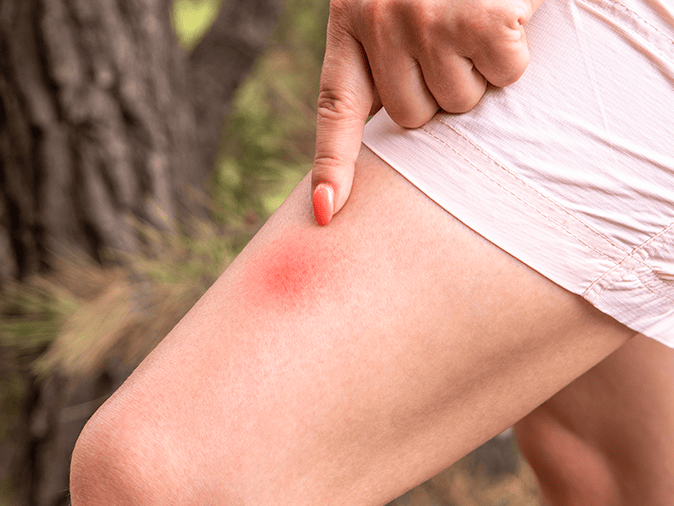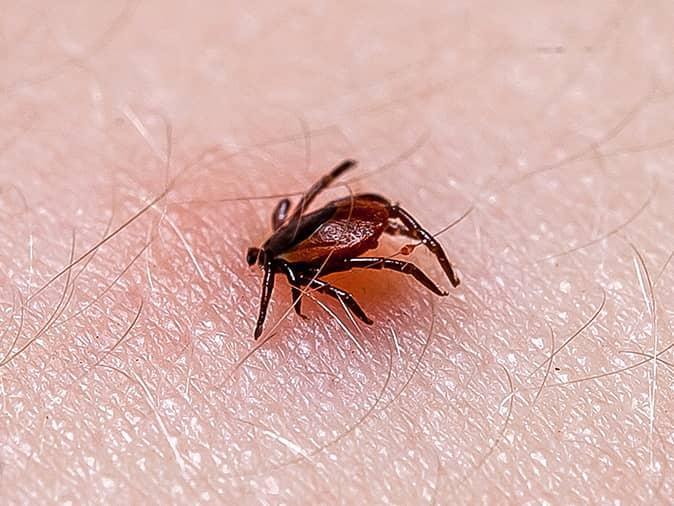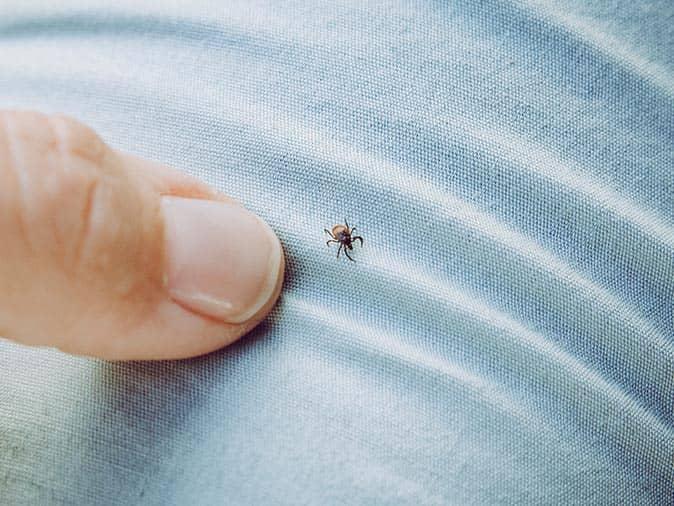If you’ve ever been on the receiving end of a bug bite (and really who hasn’t?), you know the experience can be annoying and even painful at times. But are bug bites dangerous? In this article, Arrow Pest Control, a locally owned and family-operated NJ pest control company, will identify common bug bites in New Jersey, note the health concerns associated with each type of bite, and offer tips and suggestions on how to avoid encounters with biting pests.

Bed bug bites
According to the National Pest Management Association, bed bugs have been a household pest issue for more than 3,300 years. Unfortunately, these biting pests continue to thrive in modern times and are a common problem in homes, apartment, and businesses throughout New Jersey.
Bed bug bites, often the first sign of a bed bug infestation, are similar in appearance to other bug bites so it can be hard to determine what insect made the mark. In order to distinguish a bed bug bite from other insect bites, here’s what you should look for:
- A “line” of bites on exposed skin – these bugs don’t usually make an effort to crawl under clothing.
- Groupings of bites on skin, usually on arms, legs, and other body parts exposed while sleeping.
- Raised, red bumps
Not everyone reacts the same to bed bug bites so keep in mind that there may not be any redness, itching, or any other indication that you’ve been bitten by one or more of these “red coates”. Also, a reaction may occur several days after the bed bug bite happened.
While they are stress-inducing and may rob you of a peaceful slumber, bed bugs are not dangerous and are not capable of transmitting illness to people.
Mosquito bites
A mosquito bite occurs when a female mosquito pierces the skin with her special mouthpart called a proboscis to suck up blood. As she does this, she injects saliva into the skin which is what causes redness and welts.
Mosquito bites are typically small, raised bumps on the skin and are accompanied by a desire to itch the skin where the bite occurred. Other reactions can include swelling and soreness in varying degrees.
Mosquito bites are a well-known and highly unpleasant part of summer in New Jersey but worse than that, an infected mosquito can spread disease. Mosquito-borne illnesses in our region include:
- West Nile virus (WNV)
- Eastern Equine Encephalitis (EEE)
- St. Louis Encephalitis (SLE)
While Chikungunya and Zika are not vector-borne diseases in New Jersey, residents should be careful when returning from states or countries where the diseases may occur.
Flea bites
If you have a dog or outdoor cat, we’re sure you know what fleas are and even have your four-legged family member(s) on some sort of treatment protocol to protect them from these biting pests. But for those not overly familiar with flea bites, here’s what you should look for:
- Small, red dots
- Bites on feet, ankles, and lower legs
- Clusters of two or three bites
Flea bites are often extremely itchy but are usually harmless. Allergic reactions can occur, often in the form of hives or rashes. Although it rarely happens, fleas can spread tapeworm and other parasites to animals and people.
We’d be remiss if we did not mention the plague. Not endemic in New Jersey, the plague is a problem for states in the western part of the country, particularly Arizona, California, Colorado, and New Mexico. Travelers to those areas should exercise caution.
Tick bites
Tick bites can be hard to identify since they look similar in appearance to other bug bites common in our region. Without finding an attached tick on your person, you may find it difficult to determine the source of the bite. That said, tick bites may appear as small, red bumps on the skin. You may also notice redness develop without a notable bump.
New Jersey is home to several types of ticks including the notorious blacklegged tick. Also known as the deer tick, this biting pest is the one that most residents are aware of because of its ability to spread Lyme disease. Only deer ticks that are infected with Lyme are capable of spreading the illness and they only acquire it by feeding on the blood of already infected mice, deer, and other animals.
A classic sign of Lyme disease is the bull’s eye rash but since it does not appear 100% of time, residents of New Jersey should know these other signs of Lyme:
- Neck stiffness
- Fatigue
- Fever
- Chills
- Headaches and/or migraines
- Joint pain and muscle aches
Other tick-borne diseases in New Jersey include Rocky Mountain Spotted fever, ehrlichiosis, anaplasmosis, and babesiosis.
Spider bites
House spiders and jumping spiders are two of the most common types of spiders in New Jersey and may bite to defend themselves. A spider bite from one of these arachnids may cause minor, localized pain, possible itching and swelling but their venom is not harmful to humans.
The same cannot be said for black widow spiders, which we find here in the Garden state on occasion. A black widow spider bite may be identified by double fang marks at the site of the bite, redness, and some swelling as well as localized pain.
More severe symptoms from a black widow spider bite usually starts to occur within 20 minutes to an hour after the bite and may include:
- Severe muscle cramps
- Abdominal pain
- Weakness
- Tremors
If you are bit by a black widow spider and are experiencing health issues, seek medical attention right away.
Bug bite prevention tips
Since most of the bites we covered above tend to take place during spring, summer, and fall, we recommend taking extra precautions during these seasons.
- Wear clothes that provide full coverage, namely long-sleeved shirts and pants, when spending any amount of time outdoors and especially in areas where these insects are likely to be.
- Forgo wearing perfumes and scented lotions when spending time outside.
- Talk with your family physician about using an insect repellent.
- Stay on hiking trails and avoiding areas with tall grass, shade, and standing water.
Bed bug prevention tips
Unlike mosquitoes, ticks, and fleas, bed bugs are not a pest you have to worry about running into outside. No, you’ll find bed bugs where you find people. To avoid bed bugs and the bites that accompany these pests, you should:
- Inspect your hotel room before bringing your suitcases into the room.
- Check your suitcases and belongings for bed bugs after traveling.
- Ask your houseguests to inspect their belongings for bed bugs.
- Avoid buying secondhand furniture including and especially mattresses and box springs
How to get rid of biting bugs in New Jersey
If you’re dealing with mosquitoes, ticks, bed bugs, or other biting pests in Paramus, Chatham, and Bloomfield or elsewhere in Arrow’s multi-county service area, contact us for help!




